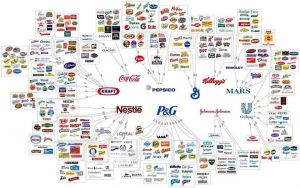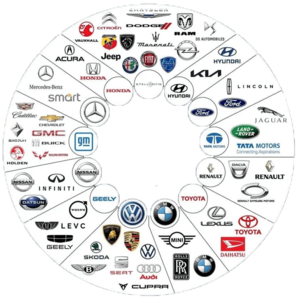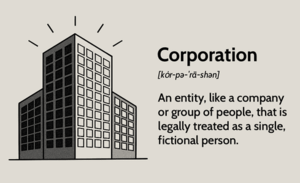Corporation: Difference between revisions
mNo edit summary |
mNo edit summary |
||
| Line 14: | Line 14: | ||
==== Proposed solutions. ==== | ==== Proposed solutions. ==== | ||
To resolve this issue, | To resolve this issue, [[Tenet|Tenets]] need to be baked in from the start. These hard coded rule need to describe the operations of the organisation in a [[ROM|read only]] format so that from inception and during the entirety of it existence they remain the same. This feature prevents the system from diverging from its initial function even if there is a takeover. | ||
====References==== | ====References==== | ||
<references /> | <references /> | ||
Revision as of 03:15, 3 November 2023
A traditional corporate entity is a collective joined together by articles of incorporation in pursuit of profit. Although it may be comprised of individual parts such as directors, officers, and shareholders, a corporation is a legal entity in and of itself. This was determined by Santa Clara County vs Southern Pacific Railway in the US Supreme court in 1886[2]. In essence, this case was a dispute over a railway route in the US and determined whether the Supreme Court identified a private corporation as a “natural person” under the U.S. Constitution and therefore entitled to protection under the Bill of Rights.
Behaviour

The prime driver of all corporate entities is self-survival. The second, is their fiduciary duty to pursue revenue for the financial gain of employees and shareholders. These paramount, binding principles gives corporations a machine like quality which if it was a natural person[2] would meet the diagnostic criteria for psychopathy[1]. These general traits of corporations are compounded by the fact that people with narcissistic traits tend to get promoted 39% faster in their progression to CEO[3] resulting in at least three times as many psychopaths in executive or CEO roles than in the overall population[4].
Why is that so bad? They get the job done after all!
Psychopathic behaviour is bad, for everyone, as they only amount to 1% of the adult population, but are reported to be responsible for about 50% of all serious crimes and constitute 20% of (North American) prison populations[5]. This will only get worse with the emergence of of A.I. as power will further centralise into the few who hold these traits.

Solutions
Past solutions?

Numerous startups are launched on the premise of challenging and transforming the existing norms and conventions. Yet, the reality of funding poses a challenge: a significant number of these new companies rely on venture capital investments, which are inherently driven by the pursuit of profit. This financial dependency can make it difficult for a company to prioritize anything over profit-making. Even in cases where ethical considerations are explicitly valued, such as Google's initial "Don't Be Evil" motto—which was notably dropped from its code of conduct in 2022—commercial interests often end up taking precedence over ethical ones.
Proposed solutions.
To resolve this issue, Tenets need to be baked in from the start. These hard coded rule need to describe the operations of the organisation in a read only format so that from inception and during the entirety of it existence they remain the same. This feature prevents the system from diverging from its initial function even if there is a takeover.
References
- ↑ 1.0 1.1 The Corporation: The Pathological Pursuit of Profit and Power. Bakan, Joel, New York: Free Press, 2004. https://thecorporation.com/
- ↑ 2.0 2.1 2.2 Santa Clara County v. Southern Pacific, U.S. Supreme Court (1886): 118 U.S. 394. Decided: May 9, 1886. Accessed 6th Jan 2022 via https://supreme.justia.com/cases/federal/us/118/394/
- ↑ The perks of narcissism: Behaving like a star speeds up career advancement to the CEO position. The Leadership Quarterly: Published June 2021, Accessed 28th September 2022 via https://doi.org/10.1016/j.leaqua.2020.101489
- ↑ Corporate Psychopathy: Talking the Walk. Paul Babiak, Ph.D.y, Craig S. Neumann, Ph.D.z and Robert D. Hare, Ph.D. Behavioral Sciences and the Law. Behav. Sci. Law 28: 174–193 (2010). Published online 6 April 2010 in Wiley InterScience DOI: 10.1002/bsl.925. Accessed on 28 September 2022 via https://www.sakkyndig.com/psykologi/artvit/babiak2010.pdf
- ↑ Without conscience: The disturbing word of the psychopaths among us. Hare, R. (1999). New York: Guildford Press. https://www.google.com/books/edition/_/xfIEVtzj52YC?hl=en
